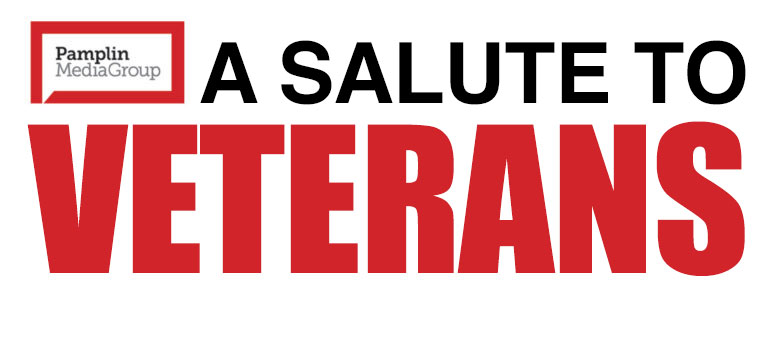Banks veteran may be damaged, but he's far from broken
Glen “Fitz” Fitzpatrick spent 20 years in the military.
In that time, he earned a Purple Heart, Bronze Star and many more medals than can be listed in this space.
But while Fitzpatrick did a lot for the Army, it’s what it did for him that seems to stick with him.
“It made me the person I am today,” Fitzpatrick said. “Serving people has always been a thing for me. Whether serving locally, serving my family, serving people in my city, it’s what I was always compelled to do, and the military allowed me to do that on a much larger scale.”
Fitzpatrick enlisted during his senior year at Rex Putnam High School in Milwaukie.
“My mom and dad both served, and so I felt compelled to do it from that standpoint,” he said, “but I also didn’t have a lot of other options.”
After two and a half years of training, including as a combat medic and in practical nursing, Fitzpatrick returned home as a reservist.
But after Sept. 11, 2001, everything changed.
The United States invaded Afghanistan in response to the 9/11 terror attacks, then expanded its “war on terror” to Iraq a year and a half later. In 2003, Fitzpatrick was off to the Middle East as part of the invasion of Iraq.
Fitzpatrick served as part of the Fourth Infantry Division with the Army’s forward surgical team, providing surgical support for patients who couldn’t survive transport to the hospital.
“The Army learned that it’s difficult to move patients and keep them alive,” Fitzpatrick said. “So, if we pushed that advanced medical care and surgical support further forward onto the battlefield, we could have better success saving soldiers’ lives.”
Fitzpatrick’s unit was among those that took the brunt of the fighting in the first phase of the war. It went from Baghdad north to places like Balad and Samarra, strongholds of Saddam Hussein’s Ba’ath Party.
Three months into that forward movement, Fitzpatrick said, his unit was forced to return stateside after injuries and overall damage rendered them no longer mission-capable.
“We got into a pretty significant event, and I took shrapnel from a mortar,” Fitzpatrick said. “We couldn’t fulfill our mission anymore, so they sent a bunch of folks home.”
His active service done — for the time — Fitzpatrick began working for the Salem Fire Department. But he remained in the Army Reserve and was deployed again in 2013, this time to Afghanistan for nine months.
Fitzpatrick is candid about the effects of the two wars on his psyche. He has post-traumatic stress disorder, which he attributes both to his Army service and his career in fire and rescue.
“I experience symptoms of post-traumatic stress in my daily life,” he said. “It cost me 18 months with my kids, it cost me a divorce, it ultimately cost me my career as a firefighter — so, it’s had a pretty significant impact on my life.”
At his nadir in battling PTSD, Fitzpatrick spent 18 months in treatment. He credits the professionals who helped him and the work he put in during that time for getting him to a much better place today.
He also credits his wife — a veteran herself — for understanding and always being there for him in the way he needed her to be.
“My wife is an incredibly patient woman who understands when I’m having a bad day and gives me the space to have that,” he said. “She loves me through it, which I think is a pretty incredible thing.”
Fitzpatrick thinks it’s important that people understand PTSD and the complications that come with it and that they treat it and those complications accordingly.
“I think it’s important that people know that this (PTSD) is not a source of embarrassment or pride, but rather one of normalization,” he said. “What I experienced is an injury, and I’m not broken.
“Yes, I deal with anxiety, a little depression, I don’t do real well in crowds, and I don’t sleep well at times, but it’s an injury that can be fixed. Just like if you tore up your knee, it doesn’t immediately heal. It takes time. And while it may never be the same, it’s still functional.”
Today, Fitzpatrick lives in Banks. He’s back in the business of fighting fires, working full-time for the Oregon State Fire Marshal’s Office and volunteering as a lieutenant with the Banks Fire District.
In his spare time, Fitzpatrick loves fly fishing. He considers the outdoors his “happy place,” spending as much time there and doing that as he can.
Despite the obvious difficulties he experienced in and since his time with the military, he is quick to speak to its virtues and still sees its value for young people today.
“I try to share with people all the time that it’s not just about the skill set or the money for college or any of those things,” Fitzpatrick said. “It’s about the service, and I’ll always feel great about that.”
And with that specific service in the rearview mirror and his time working in fire and rescue winding down, what does Fitzpatrick see himself doing over the remainder of his years? He’s not entirely sure, but he’s looking forward to watching it play out and doing what he’s always done — serve.
“I follow opportunities, and I don’t chase dreams,” he said. “I don’t know what the next 30 or 40 years hold, specifically, but I’ll continue looking for those opportunities to serve, finish strong, and make sure that we’re people that really, truly make a difference in the place that we live.”


